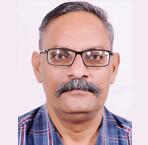Invited Speaker---Dr. Z.V.P. Murthy

Dr. Z.V.P. Murthy
Professor, Department of Chemical Engineering, Sardar Vallabhbhai National Institute of Technology (SVNIT), India
Dr. Z.V.P. Murthy is a Full Professor (since 2006) of Chemical Engineering Department at Sardar Vallabhbhai National Institute of Technology, Surat, Gujarat, India. He has obtained B.Tech. from Regional Engineering College, Warangal (presently National Institute of Technology, Warangal); M.Tech. from Indian Institute of Technology, Kharagpur; and Ph.D. from Indian Institute of Technology, Delhi; all in Chemical Engineering. He has over 2 years of industrial and over 23 years of teaching/research experience. His research interests are wastewater treatment, separation processes (membrane separations, adsorption, electrocoagulation, etc), nanomaterials. He has published 240 full papers in various technical journals (of which 162 are in SCI/SCIE journals papers) and reviewed/reviewing technical papers for 154 journals (of which 131 are SCI/SCIE journals). Supervised 18 Ph.D. theses (of which 3 received Best Ph.D. Thesis Awards at National level) and 4 are going-on. Guided 38 M.Tech./M.E. Dissertations (of which 2 received Best and Second Best Dissertation Awards at National level). He is in the Editorial Board of: Waste and Biomass Valorization; Athens Journal of Technology and Engineering; Athens Journal of Sciences. Also, Guest Edited a Special Issue for Separation Science and Technology.
Speech Title: Overview of Membrane Separation Processes and Application in Wastewaters Treatment
Abstract: In the present presentation an over view of different membrane separation methods, viz., ultrafiltration (UF), nanofiltration (NF) reverse osmosis (RO), dialysis, electrodialysis (ED), pervaporation (PV), and membrane bioreactor (MBR) was presented. Effluents from various industries contain different types of pollutants. Heavy metals are one of the most important contaminants in the environment. Removal of heavy metals from wastewaters is of critical importance due to their high toxicity and tendency to accumulate in living organisms. Moreover, heavy metals can not be degraded or destroyed. Membrane technology is one option for the remediation / treatment of heavy metals from wastewaters without generating any extra pollution load.



